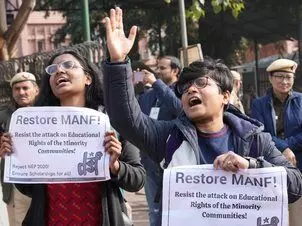
JNU imposes new rules of cancelling admissions for violence, Rs 20,000 fine for dharna
text_fieldsNew Delhi: The most recent rules at Jawaharlal Nehru University state that students can be fined up to Rs 30,000 or have their admissions revoked for engaging in acts of violence and Rs 20,000 for staging dharnas.
The 10-page "Rules of Discipline and proper conduct of students of JNU" outlines penalties for various offences like protesting and forging documents, as well as how to perform a judicial inquiry and record a statement.
According to the document, the rules came into effect on February 3. It came after the university witnessed a slew of protests over the screening of a BBC documentary.
The rules document states that it has been approved by the Executive Council, the highest decision-making body of the university.
However, Executive Council members said that the issue was brought as an additional agenda item and it was mentioned that this document has been prepared for "court matters".
The Akhil Bharatiya Vidyarthi Parishad's JNU Secretary Vikas Patel termed the new rules "authoritarian ('tughlaqi')" while asserting that the old code of conduct was sufficiently effective. He demanded a rollback of this "draconian" code of conduct.
JNU Vice Chancellor Santishree D Pandit did not respond to texts and calls from the media seeking her reaction.
The rules will apply to all students of the university, including part-time students whether admitted before the commencement of these rules or after, the document states.
Punishments have been listed for 17 "crimes" including blockage, indulging in gambling, unauthorised occupation of hostel rooms, use of abusive and derogatory language and committing forgery. The rules also mention that a copy of the complaints will be sent to the parents.
Cases involving both teachers and students may be referred to the Grievance Redressal Committee of the university, school and centre level. Sexual abuse, eve-teasing, ragging, and arousing communal disharmony cases are of the purview of the chief proctor's office.
Chief Proctor Rajnish Mishra said, "There were rules mentioned in the statute. However, the new rules have been formulated after a proctorial enquiry." He did not reveal when this proctorial enquiry started and when asked whether old rules have been modified, she replied in affirmation.
It has proposed punishments for all acts of violence and coercion such as gheraos, sit-ins or any variation which disrupts normal academic and administrative functioning and/or any act which incites or leads to violence.
The punishments include "cancellation of admission or withdrawal of degree or denial of registration for a specified period, rustication up to four semesters and/or declaring any part or the entire JNU campus out of bounds, expulsion, a fine of up to Rs 30,000 as per the old rules, One/two semesters of eviction from the hostel".
If the matter is sub-judice, the chief proctor's office will take action as per the order and direction of the honourable court, the rules state.
For hunger strikes, dharnas, group bargaining and any other form of protest by blocking the entrance or exit of any of the academic and/or administrative complexes or disrupting the movements of any member of the University community, a fine of up to Rs 20,000 will be levied.
According to the old rules, for gheraos, demonstrations and sexual harassment, the proposed punishments were cancellation of admission, rustication and expulsion.
This statute states the university has a proctorial system where the administration of student-related matters about all acts of indiscipline are delegated to the chief proctor. He and she are assisted by proctors. The size of the Proctorial Board is decided by the competent authority.
After receipt of a complaint, it will be scrutinized by the chief proctor who will set up a proctorial enquiry.
"Subsequently, either a one/two/three member(s) proctorial enquiry committee to conduct an in-depth investigation into the matter. Proctorial enquiry is an internal enquiry of JNU and hence, no other person except the Board members is allowed to be present during hearings.
"The accused or complainants is not allowed to be represented by a third party. Similarly, he/she cannot have an observer during the process of enquiry," the document read.
An Executive Council member, who does not wish to be named, said the matter was not discussed at length in the EC meeting and "we were told that the rules have been created for court matters".
Another Executive Council member Brahma Prakash Singh said: "The university might have planned to streamline the process and prepare a full document but it should have been discussed in the EC meeting properly." The ABVP's JNU Secretary Vikas Patel said, "There is no need for this new authoritarian ('tuglaki') code of conduct. The old code of conduct was sufficiently effective.
"Instead of focusing on improvement of safety security and order, the JNU admin has imposed this draconian code of conduct, without any discussion with the stakeholders, especially the student community. We demand its rollback."
With PTI inputs
























